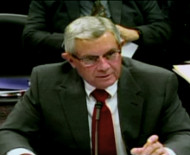4/2/2015
Nevada Needs More Traffic Tickets To Pay Judicial SalariesDecline in speeding ticket revenue throughout Nevada threatens the state judicial budget.

Nevada courts are out of cash because police are not writing enough speeding tickets. State Supreme Court Chief Justice James W. Hardesty sounded the warning before the state Joint Subcommittee on General Government on March 11, telling lawmakers that the coffers are running dry at an alarming rate.
"We thought the decline would be about three or so percent," Justice Hardesty explained. "We budgeted for a five percent decline in the budget that the governor recommended. We now believe based on the numbers we're seeing that the decline will actually be ten percent. This is a serious problem, not only for the Supreme Court's budget, but also for those budgets in the state general fund that are supported by administrative assessments."
In 2010, 615,267 traffic and parking tickets were issued statewide. This dropped to just 484,913 last year. The 21 percent reduction in revenue is hitting the courts hard.
"We probably will be close to 400,000 in 2015," Justice Hardesty told committee members. "I mean this is the concern that all of us together, senator, need to address.... With all due respect to the citizens of Nevada, I don't think anyone is driving better. I think the truth is, we're seeing less traffic violations because law enforcement's priorities have changed dramatically."
The judicial branch spends $51 million each year to operate, with all but $20 million coming from the state general fund. Roughly the same amount, $21 million, pays the salaries of the state's justices and judges. The chief justice believes paying judges out of traffic fines is the wrong way to fund the courts.
"The Supreme Court is the one who's encouraging people to violate the law so we have enough money to operate," Justice Hardesty observed. "That seems like an oxymoron. I would urge the legislature to give serious consideration to changing the manner by which the Supreme Court is funded."
The chief justice told lawmakers that it was their constitutional duty to fund the courts and that the $1.4 million budgetary shortfall should be paid from the general fund, instead of encouraging more ticket-writing statewide.
"If this issue is not addressed before May 1, the court will not have sufficient cash to operate," Justice Hardesty warned. "Do you want me to close the judicial branch of government at the state level on May 1? ...If we don't fix this problem, the Supreme Court will be broke in the next biennium."


